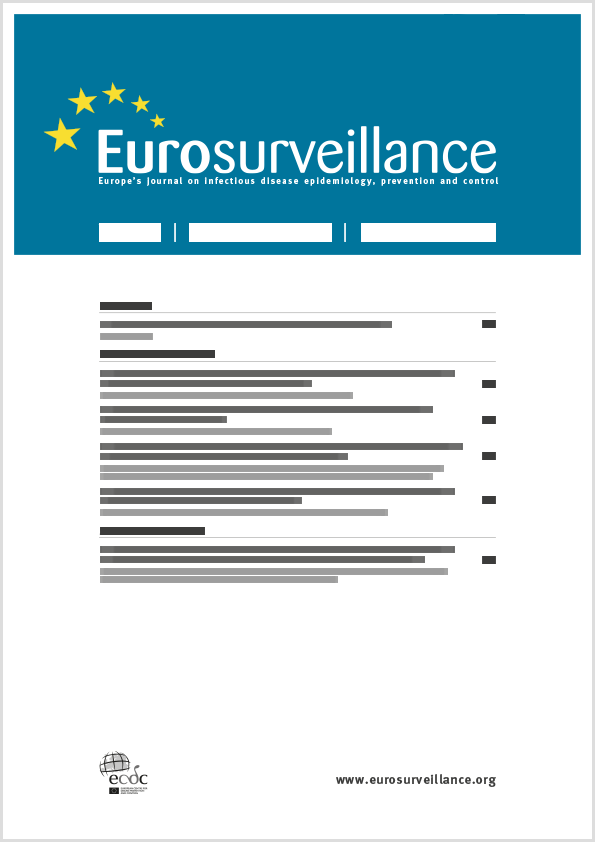- Home
- Eurosurveillance
- Previous Issues
- Volume 26, Issue 12, 25/Mar/2021
Eurosurveillance - Volume 26, Issue 12, 25 March 2021
Volume 26, Issue 12, 2021
- Rapid communication
-
-
-
Robust antibody responses in 70–80-year-olds 3 weeks after the first or second doses of Pfizer/BioNTech COVID-19 vaccine, United Kingdom, January to February 2021
More LessSera were collected from 185 adults aged ≥ 70 years in London to evaluate the immune response to COVID-19 vaccines. A single dose of Pfizer/BioNtech vaccine resulted in > 94% seropositivity after 3 weeks in naïve individuals using the Roche Spike antibody assay, while two doses produced very high spike antibody levels, significantly higher than convalescent sera from mild-to-moderate PCR-confirmed adult cases. Our findings support the United Kingdom’s approach of prioritising the first dose and delaying the second dose of COVID-19 vaccine.
-
-
-
Detection of SARS-CoV-2 lineage P.1 in patients from a region with exponentially increasing hospitalisation rate, February 2021, Rio Grande do Sul, Southern Brazil
More LessThe emergence of SARS-CoV-2 P.1 lineage coincided with a surge in hospitalisations in the North region of Brazil. In the South region’s Rio Grande do Sul state, severe COVID-19 case numbers rose 3.8 fold in February 2021. During that month, at a COVID-19 referral hospital in this state, whole-genome sequencing of a subset of cases’ specimens (n = 27) revealed P.1 lineage SARS-CoV-2 in most (n = 24). Findings raise concerns regarding a possible association between lineage P.1 and rapid case and hospitalisation increases.
-
- Top
-
- Research
-
-
-
Healthcare workers’ knowledge, attitudes and behaviours with respect to antibiotics, antibiotic use and antibiotic resistance across 30 EU/EEA countries in 2019
More LessBackgroundWhile several studies have assessed knowledge, attitudes and behaviours of the public, physicians and medical students in a number of EU/EEA countries with respect to antibiotic use and antibiotic resistance, there is a paucity of literature for other healthcare workers. This survey aimed to fill this gap.
MethodsA 43-item online questionnaire was developed, validated and pilot-tested through a modified Delphi consensus process involving 87 Project Advisory Group (PAG) members, including national representatives and members of European health professional groups. The survey was distributed by the PAG and via social media to healthcare workers in 30 EU/EEA countries.
ResultsRespondents (n = 18,365) from 30 EU/EEA countries participated. Knowledge of antibiotics and antibiotic use was higher (97%) than knowledge of development and spread of antibiotic resistance (75%). Sixty percent of respondents stated they had received information on avoiding unnecessary prescribing, administering or dispensing of antibiotics. Among respondents who prescribed, administered or dispensed antibiotics, 55% had provided advice on prudent antibiotic use or management of infections to patients, but only 17% had given resources (leaflets or pamphlets). For community and hospital prescribers, fear of patient deterioration or complications was the most frequent reason (43%) for prescribing antibiotics that were considered unnecessary. Community prescribers were almost twice as likely as hospital prescribers to prescribe antibiotics due to time constraints or to maintain patient relationships.
ConclusionIt is important to move from raising awareness about prudent antibiotic use and antibiotic resistance among healthcare workers to designing antimicrobial stewardship interventions aimed at changing relevant behaviours.
-
- Top
-
- Outbreaks
-
-
-
Investigation of a pertussis outbreak and comparison of two acellular booster pertussis vaccines in a junior school in South East England, 2019
More LessIn March 2019, a pertussis outbreak occurred in children in a junior school (7–11 years) in England who had been offered pertussis-containing booster vaccine at 40 months of age. In a case–control investigation, we assessed the extent of transmission and any difference in protection afforded to those who had previously received a booster 3- or 5-component acellular pertussis vaccine (aP). We took oral fluid specimens from the students to determine IgG antibodies against pertussis toxin (anti-PT). Parents of students attending the school were sent a questionnaire on pertussis symptoms and vaccination status was retrieved from general practitioner records for all students. Of 381 students, 134 (35.2%) were classified as pertussis cases, 133 by demonstration of significant anti-PT IgG titres and one clinically. There was no significant difference in the risk of pertussis between students receiving 3-component (33.7%) or 5-component (32.3%) aP boosters. However, pertussis infection differed significantly in school year 4, with 22.9%, 50.0%, 23.7% and 38.1% pertussis cases in years 3, 4, 5 and 6, respectively. The proportion of students with incomplete vaccinations recorded was higher than the proportion of those not covered according to the national reported coverage, possibly contributing to sustained transmission within the school.
-
- Top
-
- Miscellaneous
- Author's correction
-
Volumes & issues
-
Volume 30 (2025)
-
Volume 29 (2024)
-
Volume 28 (2023)
-
Volume 27 (2022)
-
Volume 26 (2021)
-
Volume 25 (2020)
-
Volume 24 (2019)
-
Volume 23 (2018)
-
Volume 22 (2017)
-
Volume 21 (2016)
-
Volume 20 (2015)
-
Volume 19 (2014)
-
Volume 18 (2013)
-
Volume 17 (2012)
-
Volume 16 (2011)
-
Volume 15 (2010)
-
Volume 14 (2009)
-
Volume 13 (2008)
-
Volume 12 (2007)
-
Volume 11 (2006)
-
Volume 10 (2005)
-
Volume 9 (2004)
-
Volume 8 (2003)
-
Volume 7 (2002)
-
Volume 6 (2001)
-
Volume 5 (2000)
-
Volume 4 (1999)
-
Volume 3 (1998)
-
Volume 2 (1997)
-
Volume 1 (1996)
-
Volume 0 (1995)
Most Read This Month

-
-
Detection of 2019 novel coronavirus (2019-nCoV) by real-time RT-PCR
Victor M Corman , Olfert Landt , Marco Kaiser , Richard Molenkamp , Adam Meijer , Daniel KW Chu , Tobias Bleicker , Sebastian Brünink , Julia Schneider , Marie Luisa Schmidt , Daphne GJC Mulders , Bart L Haagmans , Bas van der Veer , Sharon van den Brink , Lisa Wijsman , Gabriel Goderski , Jean-Louis Romette , Joanna Ellis , Maria Zambon , Malik Peiris , Herman Goossens , Chantal Reusken , Marion PG Koopmans and Christian Drosten
-
- More Less


